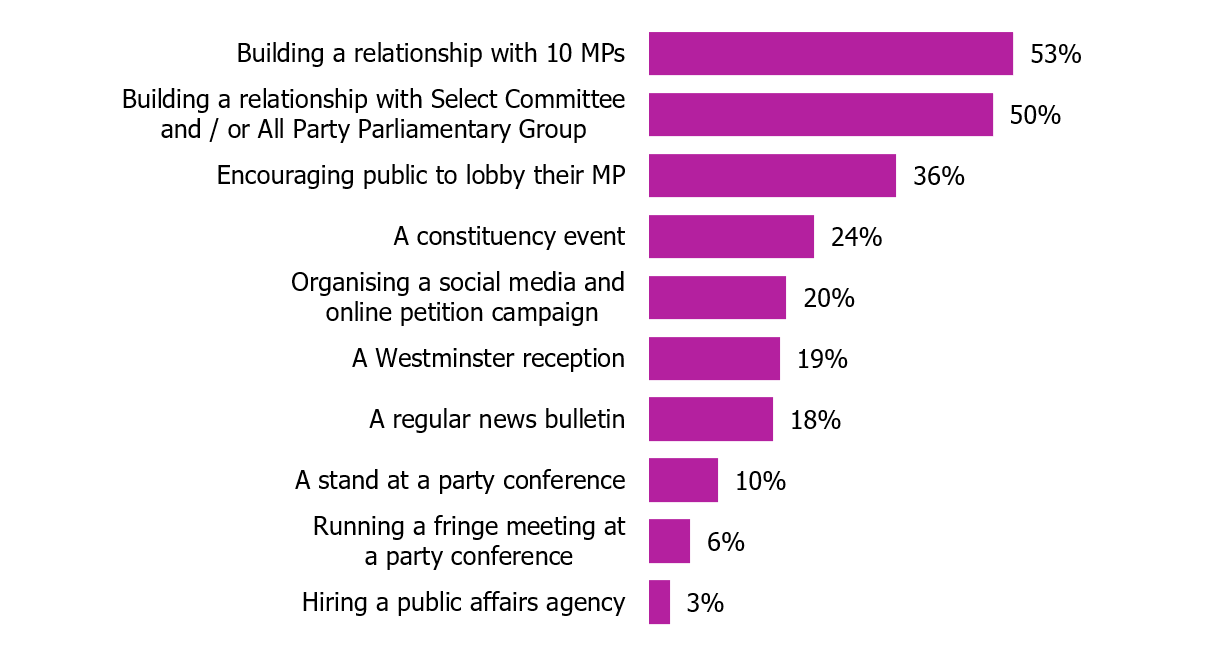Charity parliamentary teams face the constant challenge of how to best use funds to get their message heard by politicians. Charity lobbying methods are wide-ranging; from building relationships with a handful of key MPs, to increasing the profile of an issue through an awareness raising campaign, to investing in methods that encourage supporters to campaign on their behalf.
So which approach is going to be best for your public affairs, policy and campaigning work?
Many MPs think that a finely targeted approach to lobbying is best
In January this year as part of our quarterly survey of MPs, we asked MPs to imagine that they worked for a charity with a few thousand pounds to spend on lobbying MPs. We asked them to decide what they would spend that money on, allowing them to select up to three options from a prompted list.

“Imagine that you work for a charity and have a few thousand pounds to spend on lobbying MPs, which of the following would you spend it on? Please select up to three options”
Source: Charity Parliamentary Monitor, January 2018, nfpSynergy | Base: 157 MPs
The most popular choice of lobbying method was ‘building a relationship with 10 MPs’, selected by 53% of MPs. This was also highest when we last asked the question in 2008. ‘Building a relationship with a Select Committee and/or APPG’ was the next most popular charity lobbying method among MPs, mentioned by half of MPs. The popularity of these top two choices, which both involve engaging a relatively small proportion of Parliament, suggests that a substantial proportion of MPs would include a targeted approach in their strategy if they worked for a charity.
However, many organisations need to raise broader awareness of what they do among politicians
The benefits of being a charity on a politician’s radar are numerous. When politicians are in need of policy advice or briefings before a debate, they will turn to those organisations that they understand to be a credible and relevant source of information on the topic. However, they can only be reactive to your cause in these ways if they have at least a baseline awareness of who your charity is and what you specifically work on.
Our research has shown that this is particularly important following an election, where there is increased confusion among the new intake of politicians over which charities work on different issues. For example, in our first surveys after general elections with MPs (2015), and AMs, MLAs and MSPs (2016), we saw an increase in politicians naming Cancer Research UK as an organisation working in the area of ‘cancer care’, and a corresponding reduction in mentions of Macmillan Cancer Support. Since then, politicians’ perceptions have closer reflected the real picture, with Cancer Research UK more associated with ‘cancer research’ and Macmillan Cancer Support with ‘cancer care’.
Politicians can also play an important role in signposting potential beneficiaries to your charity’s services, as part of their constituency surgeries. Citizen’s Advice has been particularly successful in making the most of this opportunity, by producing a helpful guide for all MPs to use as a toolkit when supporting constituents.
Remember that even broad communications with politicians can be tailored
Over the years MPs have told us that charity campaigns really stand out from the crowd when their messages are tailored and relevant to them. One great way to do so is by using constituency statistics. Is there a handout you can give to MPs attending your event that summarises how many people in their constituency are affected by, say, a particular health condition? Or how, for example, incidences of environmental pollution in their constituency compare to the UK average?
One technique you might currently be using is to ask your supporters to email their MP on your behalf. While mobilising large numbers of supporters can be incredibly powerful, politicians are increasingly put off by identical emails that do not feel authentic or tailored. How can you equip your supporters to personalise and tailor their communication with their political representatives?
Bringing balance to the evaluation of your parliamentary work
We would always recommend that charities engage a wide range of MPs with their cause. The Charity Parliamentary Monitor allows you to measure your success in this area, through tracking the overall awareness and reputation of your organisation and its campaigning activity. Additionally, any groups of MPs that you are targeting – from MPs interested in a specific issue, or from specific constituency types – can also be looked at in more detail with the ‘core group analysis’ add-on to the Charity Parliamentary Monitor.
Please download the briefing pack below or get in touch with Heather at heather.sturgess@nfpsynergy.net if you would like to hear more about our parliamentary research at Westminster and across the devolved institutions.

